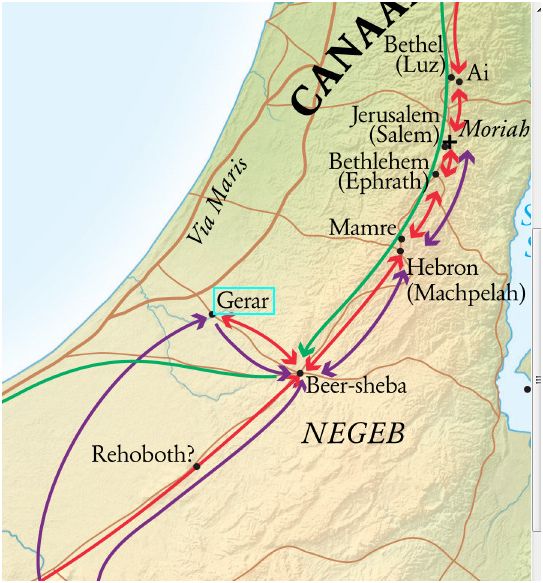 |
| Here's a map, in case you're having as much trouble following these people around as I am. |
Isaac had a dream. In it, God told him he shouldn’t go to Egypt
or to anywhere else, and that he should stick around. If he did, God would tell him where he should go, and what he
should do so that he would be heaped with blessings, and that his descendents
would be, as well, and any country where they would choose to live in the
future would be happy to have them. God
told him to go to Gerar, where the Philistines were. Gerar wasn’t a great option—it was no better, in fact, than where
he’d been living before. There was a
drought everywhere, so moving on was tempting.
The king of the Philistines at
Gerar was, of course, Abimelech. This
might have been the same King Abimelech whom Abraham ran into; this might have
been a different one. Since the name
Abimelech translates roughly as “my father was the king,” it’s possible that
this Abimelech was just another one in a long royal line of Abimelechs. Like Abraham and Sarah, Isaac and Rebekah
decided to settle in to Gerar. And like
Abraham, Isaac told everyone that Rebekah was his sister, not his wife, because
he figured everyone would kill him for her if they knew he was her husband,
because of course they would. Once it
was well established that Rebekah and Isaac were siblings, they started acting
like siblings by groping each other in public.
Abimelech himself looked out his window and saw this and called Isaac in
to talk to him.
“That has got to be your
wife!” said Abimelech. “I saw you two
in the clench!”
“Yeah, okay,” said Isaac, “you
got me.”
“Why did you lie to us about
that? And why did you do such a poor
job of covering up your lie?”
“Well, I didn’t want anyone to
kill me for her,” confessed Isaac.
“But what a terrible thing for
you to do to us!” admonished the king.
“One of our men could easily have slept with her, and then the guilt
would have been on his head!”
“Well, no,” Isaac pointed
out. “See, we’re married, so she isn’t
sleeping with anyone else.”
“How do you figure that’s any of
her business? Who sleeps with whom is a
man’s department. Trust me on this; I’m
a king.”
“But isn’t that rape?” asked
Isaac.
“That’s enough of your elitist
liberal backtalk. Look, just to make
sure we’re all safe, no one is allowed to touch you or your wife, or they risk
penalty of death. That’s a royal
decree. Now go in peace. And,” added Abimelech with a wink, “remember
to notice which females are wives and which are… not.”
Isaac set up his farm, which did
extremely well that year, despite the drought.
The Philistines were a bit envious of this, so they started to fill in
the wells that Abraham’s servants had dug years ago, because too much water
might spoil the drought. They told
Isaac that he was doing too well, so he’d better get out of town. Isaac found a nice tax shelter in the Valley
of Gerar, where Abraham had farmed. He
opened the wells up (a secret to farming that the Philistines didn’t seem to
understand). As he reopened the wells,
the local herdsmen fought him for them, and he gave them names to commemorate
these quarrels. When he found one that
the herdsmen didn’t fight him over, he called it Rehoboth, because he liked the
name, and no one could stop him from calling it what he wanted.
The competition with the herdsmen
must have gotten too hot, because Isaac decided to pull up stake again and head
up to Beersheba. When he got there, God
showed up and said,
“I am the God, the God of your
dad,
Don’t be afraid, things aren’t
bad.
You’ll do well, so will every
last kid
Of yours, because of what Abraham
did.”
Isaac then made an altar and said
God’s name, which you’re not supposed to ever do, except sometimes.
Abimelech went to Gerar to meet
with Isaac. Since it was just a
friendly social call, he brought his army with him.
“Why are you paying me a call,
even though you hate me?” asked Isaac.
“We think God likes you, so we
decided to like you, too,” explained Abimelech. They decided this was reason enough to sign a treaty and have a
party to celebrate it, because why not?
The next morning, they promised to keep on being nice to each other, and
Abimelech and his army left. Afterward,
Isaac’s servants struck water while digging a well.
“Let’s call the well Sheba,” said
Isaac.
“Why?” asked the servants.
“Because if we don’t, it won’t
make any sense when we call the town Beersheba, now will it?” snapped
Isaac. Too afraid to get on Isaac’s
nerves any further, the servants let the matter drop, and accepted the town’s
new name.


Comments